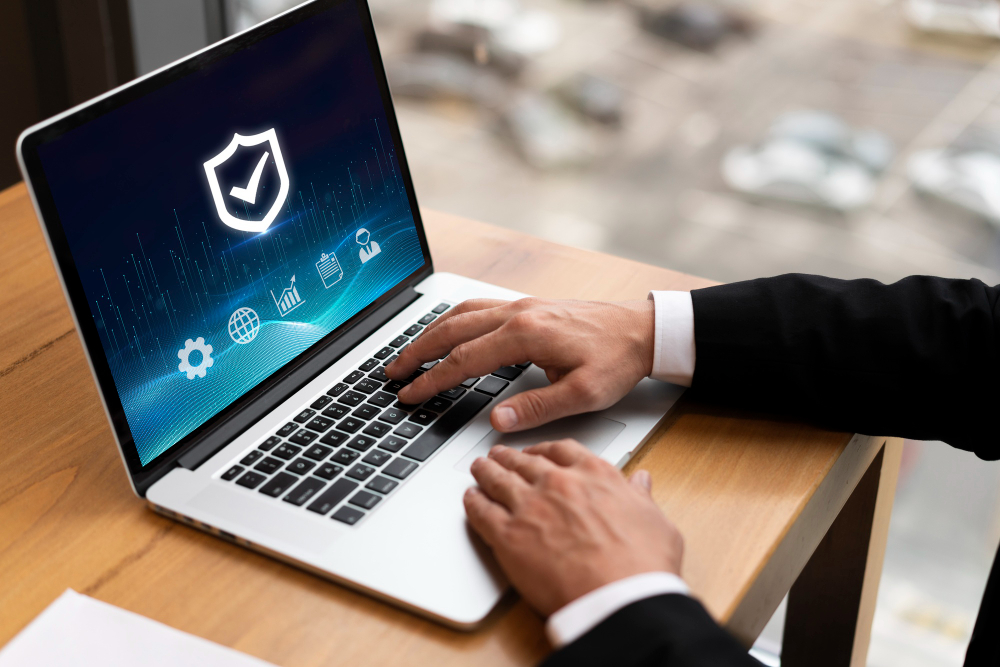Cybersecurity isn’t just for tech professionals anymore — it’s a must-have life skill in today’s digital world. Whether you’re a student, a remote worker, or just an everyday internet user, here’s how to protect yourself from modern online threats.
Table of Content
Introduction
In 2024, our lives are more connected than ever before. From banking and shopping to studying and socializing, almost everything we do has a digital footprint. But with that convenience comes risk. Cyber threats are no longer limited to corporations — they’re increasingly targeting individuals, and often, beginners are the most vulnerable.
The good news? You don’t need to be a tech expert to stay safe. With a few smart habits and basic awareness, you can dramatically improve your online safety and protect your personal data from prying eyes.
Why Cybersecurity Matters in Everyday Life
Cybersecurity is the practice of protecting your digital devices, accounts, and data from unauthorized access, theft, or damage. It’s not just about firewalls or antivirus software — it’s about creating safe digital habits.
Whether you’re a student submitting assignments online or a freelancer handling sensitive client data, cybersecurity is essential. Data breaches, identity theft, and phishing scams can happen to anyone — and often do.
A 2023 report by IBM showed that human error accounted for 95% of all cybersecurity breaches.
This makes awareness your first and best defense.
Top Cyber Threats You Should Know About in 2024
The cyber landscape is evolving. Understanding the common types of cyber threats helps you identify and avoid them:
1. Phishing Attacks
Fake emails or messages that trick you into revealing login info or downloading malware.
2. Ransomware
Malicious software that locks your files and demands a payment to restore them.
3. Spyware
Secretly tracks your activity and sends your data to hackers.
4. Public Wi-Fi Snooping
Attackers can intercept data you transmit over unsecured networks.
These threats are designed to exploit trust and lack of awareness — not just tech flaws.
10 Online Safety Tips for Beginners
Even if you’re starting from scratch, these foundational tips will help protect you from most digital threats.
1. Create Strong, Unique Passwords
Use long passwords (12+ characters) with a mix of letters, numbers, and symbols. Avoid reusing them.
Pro Tip: Use a password manager like Bitwarden or 1Password.
2. Use Two-Factor Authentication (2FA)
Add a second layer of protection. Even if someone gets your password, they can’t log in without your verification code.
Apps to try: Google Authenticator, Authy, Microsoft Authenticator.
3. Avoid Public Wi-Fi Without a VPN
Free Wi-Fi is rarely secure. Hackers can easily intercept what you’re doing.
Solution: Use a reliable VPN like ExpressVPN ,NordVPN or ProtonVPN.
4. Be Cautious with Emails and Links
Don’t click on suspicious links, even if the sender seems familiar. Always verify before responding to urgent or unusual requests.
5. Update Software and Apps Regularly
Outdated software = open doors for hackers. Keep your operating system, apps, and browsers updated.
Enable auto-updates wherever possible.
6. Install Antivirus and Anti-Malware Tools
Free tools like Windows Defender are a great start. For added security, try Malwarebytes or Bitdefender.
7. Secure Your Social Media Accounts
Keep profiles private, and avoid posting sensitive personal info. Hackers can use your data to guess passwords or security questions.
8. Download Only from Trusted Sources
Avoid pirated software, cracked apps, or files from shady websites. These often carry hidden malware.
Stick to official app stores and verified publishers.
9. Back Up Your Data Frequently
Regular backups can save you in case of a ransomware attack or device failure.
Use both cloud storage (like Google Drive) and external hard drives.
10. Educate Yourself on New Threats
Cybersecurity evolves fast. Follow trusted blogs and YouTube channels to stay updated.
Recommended: Krebs on Security, The Hacker News, and r/cybersecurity on Reddit.
How Digital Safety Protects Your Privacy
Digital safety is not just about keeping hackers out — it’s about keeping your information private and under your control.
Your digital footprint includes everything from browsing history to social media posts. Advertisers, governments, and malicious actors can all track your activity if you’re not careful.
Here’s how to reduce your digital exposure:
- Use privacy-focused browsers like Brave or Firefox
- Turn off location tracking on apps when not needed
- Review app permissions regularly
- Use encrypted messaging apps like Signal
Small actions like these go a long way in protecting your digital life.
Bonus Tips for Students and Remote Workers
If you’re studying or working online, you’re more exposed to potential breaches.
Here are some extra steps to protect your environment:
- Never share meeting links on public forums
- Store important files in encrypted folders (use VeraCrypt)
- Separate personal and work/study accounts
- Use institutional platforms for submissions — not third-party sites
Staying Ahead: How to Keep Learning About Cybersecurity
Cybersecurity isn’t a one-time checklist — it’s a continuous learning curve. Here are ways to stay informed:
- Subscribe to CyberNews, Naked Security, or Threatpost
- Watch YouTubers who break down complex threats (like NetworkChuck)
- Join free courses on Coursera, Udemy, or Google’s Cybersecurity Certification
- Sign up for alerts from your antivirus provider
The best defense is staying one step ahead of potential threats.
Final Thoughts on Cybersecurity for Beginners
Online safety doesn’t require complex tools or expensive software — it starts with awareness and smart habits. As cyber threats grow more sophisticated, so must our approach to protecting ourselves.
Start today by:
- Changing weak passwords
- Enabling 2FA
- Being more mindful of what you click and download
You don’t have to do everything at once. But the more proactive you are, the safer your digital world will become.
“Security is a process, not a product.” – Bruce Schneier




